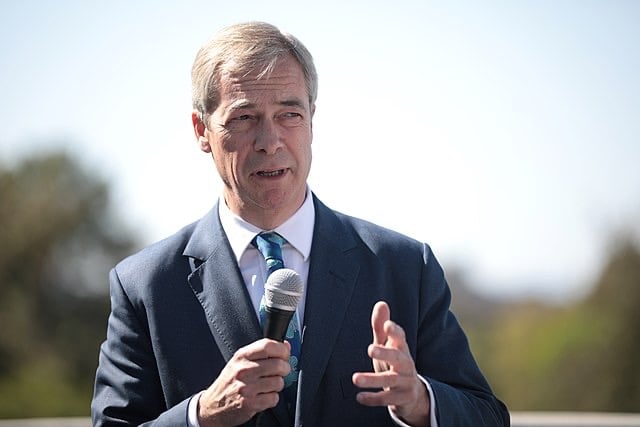Nigel Farage has launched a fierce attack on Prime Minister Sir Keir Starmer, accusing him of political opportunism and a lack of authenticity following the Labour leader’s major immigration speech. The former UKIP and Brexit Party leader—and now the figurehead of Reform UK—claimed Starmer is “playing catch-up” with his party’s policies and blasted him for appropriating the iconic Brexit slogan “take back control.”
The clash comes as Starmer attempts to reposition Labour on immigration, unveiling a series of hardline proposals in a new white paper that includes stricter requirements for citizenship and a call for stronger border enforcement. But Farage isn’t buying it—and neither are many on the political right who see Starmer’s sudden pivot as a desperate bid to counter the growing popularity of Reform UK.
Starmer’s “Take Back Control” Sparks Backlash
The Controversial Choice of Words
When Sir Keir Starmer took to the podium this week to unveil his government’s new immigration strategy, few could have predicted the phrase that would dominate headlines: “take back control.” The slogan, made famous during the 2016 Brexit referendum, became a rallying cry for Leave supporters across the UK. To hear it now from the lips of a Labour Prime Minister who once opposed Brexit left many political observers—and Nigel Farage in particular—stunned.
According to Starmer, the phrase represents a renewed effort to restore public confidence in the UK’s immigration system. He outlined proposals to raise the bar for citizenship, clamp down on illegal migration, and ensure immigration policy serves the country’s economic needs.
But for critics like Farage, the slogan’s use was nothing short of political theft.
Historical Ties to the Brexit Campaign
Farage was quick to point out that he had been using the phrase “take back control” long before it became the centerpiece of the official Brexit campaign. In a pointed interview with GB News, he stated:
“Keir Starmer has spent his whole career campaigning for free movement of people… Now he’s trying to use my language? It’s not just insincere, it’s downright laughable.”
The irony of the former Remainer-turned-Prime Minister co-opting one of Brexit’s most iconic catchphrases was not lost on social media, where commentators on both sides of the aisle questioned Starmer’s motivations.
Farage’s Fierce Response
Claims of Policy Mimicry and Strategic Opportunism
Farage didn’t stop at language. He went on to accuse Starmer of adopting Reform UK’s immigration policy playbook in a bid to stem the party’s rise in national polling.
“He’s just basically playing catch-up with Reform,” Farage declared. “He’s trying to tap into the same public sentiment, but without any of the conviction or consistency.”
Reform UK has made immigration its cornerstone issue, consistently pushing for stricter border controls, limits on asylum claims, and a reduced intake of foreign workers. Farage sees Labour’s latest policy shift as an attempt to neutralize that threat—but insists voters will see through it.
“He’s Playing Catch-Up,” Farage Warns
Farage’s central argument is that Starmer lacks credibility. While the Labour leader now warns of Britain becoming a “nation of strangers,” Farage argues such rhetoric is alien to Starmer’s political DNA.
“You wouldn’t have heard the PM say anything like this before he got into Number 10,” Farage scoffed. “It’s not what people from the North London dinner party set talk about. He’s trying on someone else’s clothes, and they don’t fit.”
The Reform UK leader also likened Starmer’s promises to those of former Prime Minister Rishi Sunak, who vowed to “stop the boats”—a pledge that ultimately went unfulfilled. Farage predicts the same fate for Labour’s current platform.
Reform UK vs Labour: Immigration at the Forefront
Policy Overlaps and Stark Differences
While there are undeniable similarities in rhetoric, key differences remain between Labour’s white paper and Reform UK’s hardline stance. Starmer’s plan emphasizes “managed migration,” economic contribution, and integration standards, whereas Reform UK pushes for caps, deportation of illegal entrants, and withdrawal from certain human rights treaties.
But in the court of public opinion, those distinctions may not matter as much. Voters who are concerned about immigration levels are already questioning whether Starmer’s shift is genuine—or simply a move to outflank Reform UK.
The Rise of Reform UK in Public Opinion
Polling data shows that Reform UK is making significant inroads, particularly in traditionally Conservative-leaning areas disillusioned by the Tory Party’s performance on immigration. Farage’s continued media presence and reputation as an unfiltered voice on national sovereignty give him a platform that resonates with a growing share of the electorate.
For Starmer, this means that even his boldest policy shifts may not be enough. If voters don’t trust the messenger, the message might fall flat.



